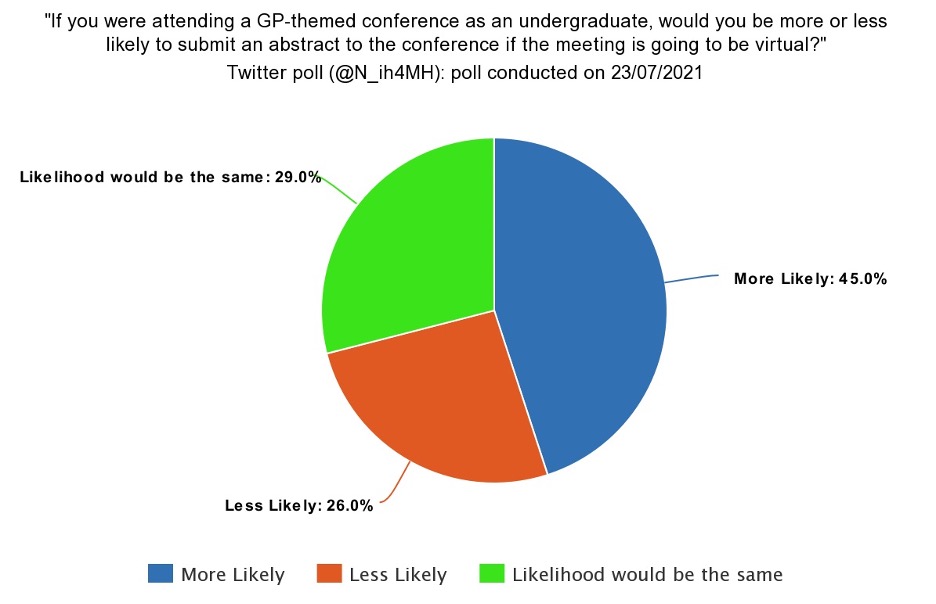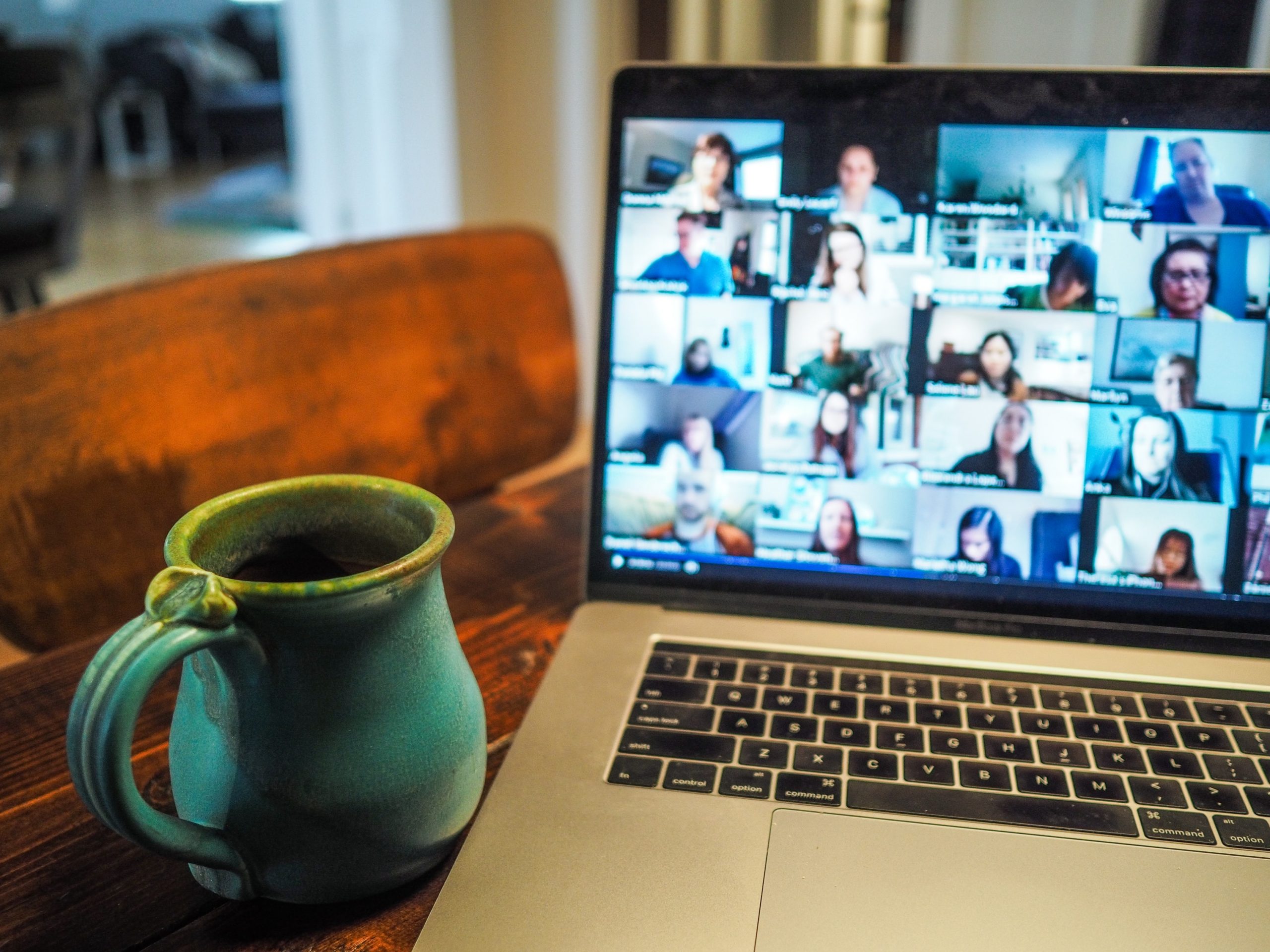 Niha Mariam Hussain is an intercalating medical student at the University of Birmingham and current President of the University of Birmingham’s GP Society.
Niha Mariam Hussain is an intercalating medical student at the University of Birmingham and current President of the University of Birmingham’s GP Society.
COVID-19 has had a significant impact on the delivery of conferences and supra-curricular educational opportunities for medical students across the world.
The outbreak compromised the way students were taught core content at university — at several UK medical schools, the majority of lecture-based learning was moved to online platforms1 and staffing and resource pressures on hospitals due to the pandemic had meant that many clinical placements for medical students were initially cancelled.
What is less acknowledged, however, is that the outbreak has also meant that in general practice, students have had fewer opportunities to learn from patients in-person while on placement, due to the rise in telephone consultations since March 2020.2 This, in addition to a lack of GP-themed supra-curricular opportunities and conferences has meant that medical students are less able to explore general practice as a career during such unprecedented times.
… online conferences are able to accommodate wider audiences and higher profile speakers from all over the world.
Since March 2020, several GP-themed conferences have been cancelled, with the remaining conferences held virtually, including the Royal College of General Practitioners’ (RCGP) Discover GP event.
As well as attending GP-themed conferences, I was involved in the delivery of the University of Birmingham’s first international virtual GP conference, as the GP Society’s Vice-President. The conference was attended by 72 people and feedback was collated to gain insight into students’ experience of the day; the results found that 68% of all delegates would recommend this conference to friends, with over 90% believing that the conference was both educational and enjoyable to attend.
The benefits of attending conferences virtually are vast; attending remotely allows students to tune in to sessions they would prefer to attend rather than participate in an all-day in-person event.
Our society’s conference featured keynote speakers such as Sir David Haslam (ex-President of the RCGP) and Dr Amir Khan (from the television show GPs: Behind Closed Doors), as well as a workshop run by a GP working abroad. This is an example of how online conferences are able to accommodate wider audiences and higher profile speakers from all over the world. Thus, there are more opportunities to network and disseminate knowledge between attendees.
A recent twitter poll explored this further and found that the majority of students (45%, n = 52/115) were more likely to present research at virtual conferences rather than in-person meetings (Figure 1).

Figure 1. Pie chart depicting results of a Twitter poll on July 23rd, 2021, assessing the impact of strictly virtual conferences on the likelihood of undergraduates submitting research abstracts, N = 115
Several video conferencing platforms also allow students to ask and answer questions anonymously and record lectures, allowing delegates to confidently consolidate their learning post-event. Additionally, online conferences tend to have cheaper costs for delegates as there are fewer organising charges (such as venue hire and catering), which would normally lead to higher prices of tickets of in-person conferences. These costs, as well as additional accommodation and travel costs incurred would have deterred many students with other financial commitments from attending in-person events.3
Despite these perceived advantages, there are several issues when attending online conferences. Unreliable internet connection, difficulties navigating video-conferencing platforms such as Zoom, and family distractions all affect student experience when attending virtual conferences.
GP conferences are of paramount importance, and more of such events should be organised … to promote an interest in the specialty.
I found that the virtual setup often lacked the opportunity to allow delegates to build interpersonal relationships and have conversations within smaller groups of colleagues; this in turn led to challenges with engagement during lectures, workshops, and breakout sessions.4
Such difficulties were exemplified by a survey study involving 804 Polish medical students during the peak of the COVID-19 outbreak; 70% and 54% of responders identified ‘lack of interactions with patients/peers’ and ‘technical problems with IT equipment’ as the main issues associated with virtual learning, respectfully.5
Conferences are an exciting opportunity to network, learn, and present research to peers; however, the delivery of primary care has changed during COVID-19’s era, and is expected to continue changing post-pandemic, which may affect the exposure medical students have to this career.
GP conferences are therefore of paramount importance, and more of such events should be organised and advertised by groups that are able to host them as they serve to foster and promote an interest in the speciality.
Nonetheless, these organisations will have to weigh up the advantages and the potential drawbacks of continuing to host events virtually, instead of returning to hosting in-person conferences, which the majority of current medical students are yet to experience.
References
1. Rajab MH, Gazal AM, Alkattan K. Challenges to online medical education during the COVID-19 pandemic. Cureus 2020; 12(7): e8966.
2. Murphy M, Scott LJ, Salisbury C, et al. Implementation of remote consulting in UK primary care following the COVID-19 pandemic: a mixed-methods longitudinal study. Br J Gen Pract 2021; DOI: https://doi.org/10.3399/BJGP.2020.0948.
3. Ray I, Agarwal V, Agarwal T, Pande A. Medical student’s perspective regarding undergraduate surgical education with special reference to pandemic. Indian J Surg 2021; DOI: https://doi.org/10.1007/s12262-021-02904-0.
4. Zargaran D, Zargaran A, Phillips G, et al. COVID-19: a unique opportunity to upgrade medical conferences. J Plast Reconstr Aesthet Surg 2021; 74(3): 644–710.
5. Bączek M, Zagańczyk-Bączek M, Szpringer M, et al. Students’ perception of online learning during the COVID-19 pandemic. Medicine 2021; 100(7): e24821.
Featured photo by Chris Montgomery on Unsplash







Regularly follow British journal of GP pieces and it is refreshing having younger writers tell us about their experience engaging with our lovely specialty. Very thought provoking! I will start consciously thinking about how to direct my students who are interested in GP to these events. Well done!
As a student, I really love this piece. I’m considering applying to the academic foundation program and its worth attending conferences to show commitment to specialties that you are interested in. Its hard to show commitment at university level when conferences can be so expensive. I haven’t been able to present at a conference because fees to attend cross over £100 for students and we must commit to tickets before manuscripts are accepted. Virtual conferences, if done properly, definitely are the way to go
Interesting piece. I think integration of allowing people to view from online and also have in person conference may be a shout in the future
This is a good read and serves as reminder that many medical students are yet to attend an in person conference so are missing out on networking and research building opportunities. If meetings do continue to be virtual, organisers need to find the balance between making a profit in ticket sales and giving undergraduate students a worthwhile insight into careers. This is another relevant paper that explores Miss Hussain’s article further:
Rubinger, L., Gazendam, A., Ekhtiari, S. et al. Maximizing virtual meetings and conferences: a review of best practices. International Orthopaedics (SICOT) 44, 1461–1466 (2020). https://doi.org/10.1007/s00264-020-04615-9
This is really interesting, it provides a lot of insight into GP conferences as a whole. I do think that there should be a blended system where we can attend both virtually and face to face. It will give a greater scope and access.
It would be really useful if the RCGP were to promote their undergraduate initiatives such as Discover GP more (by emailing and asking university social media accounts to promote for more reach) and university events more so that we wouldn’t have to rely on the promotion of individual universities’ events.
Really interesting read, as someone who has very little exposure GP conferences, I know understand the impact of the pandemic on said conferences and how the recent pandemic has affected medical students accessibility to them. As a medical student, I am all too familiar with the impact of the pandemic in accessibility to clinical exposure and extra-academic exposure. A blended approach could be a good way forward for delivery of these events, limiting interaction where it can be and exposing students to medical professionals in the fields of their interest. Good read!
Fantastic article. Lovely to see this topic discussed from a student’s point of view
I received a link to this article from a medical student and thoroughly enjoyed reading it. very exciting to see twitter polls (that I voted in!) be turned into pie charts and be used to illustrate the need to organise more GP conferences- what a smart way to collect info!
This is a very well written article which precisely describes the difficulties the pandemic has posed to
learning in the profession, especially in the field of general practice. It is very pleasing to note how the writer also encourages the audience to consider using online platforms allowing sharing of knowledge with a larger audience and exploring new ways of networking, making connections and gathering information.
Well done to the writer and keep it up !